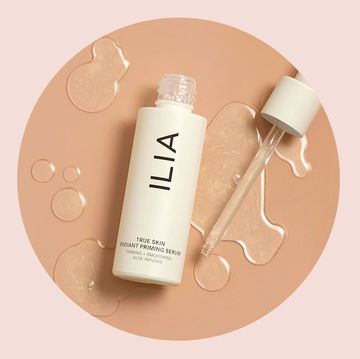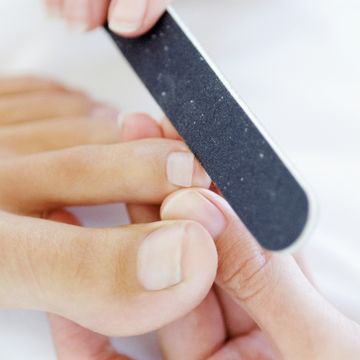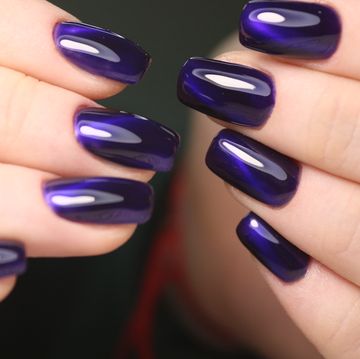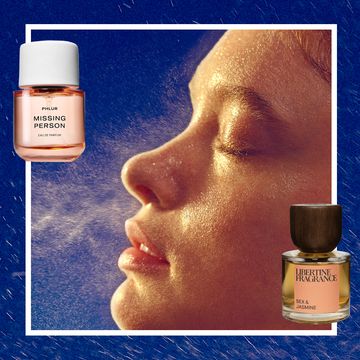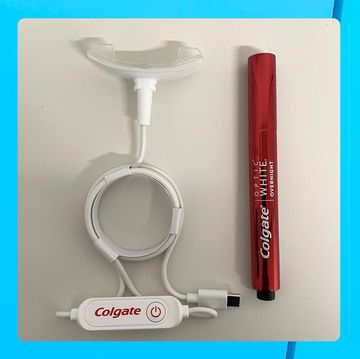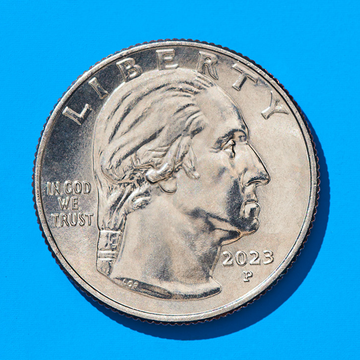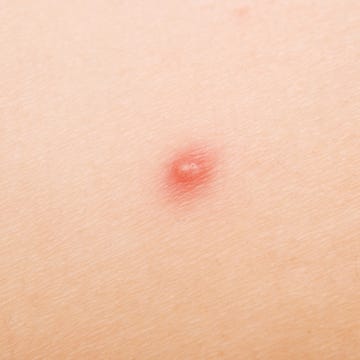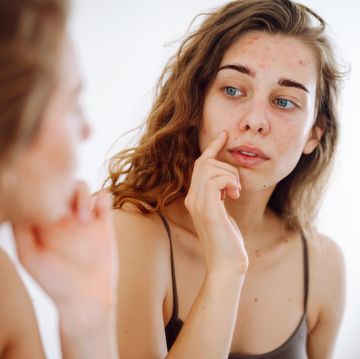When your skin is feeling pretty itchy, chances are it's something minor like a bug bite or irritation to a certain product you're using. But in some cases, it can be something more, like ringworm.
Though it might just seem like a little irritation, ringworm is actually an infection, and its primary symptom is itching. "Ringworm, also known as tinea corporis, is a fungal infection that affects the surface or superficial layer of the skin," says Tiffany Clay, MD, a board-certified dermatologist in Atlanta. It usually happens when the fungus makes its way into the upper levels of the skin, sometimes giving the affected area a scaly feeling.
Besides itching, derms often advise that there's something else that might hint at the fact you're dealing with ringworm: "Ringworm classically appears as a circle with a clear center, kind of like a donut or a ring," says Clay. Reference images in derm textbooks often show the condition on fair skin. There it often appears reddish, but for people with darker skin—who are just as prone to ringworm—that's not how it looks, says Corey Hartman, MD, a board-certified dermatologist in Birmingham. "You might not see that bright redness. It might appear more violaceous or like a darker kind of purple." Hartman says it also tends to leave behind more discoloration as a result.
But don't panic if you think you're experiencing these symptoms. Hartman says that ringworm isn't severe. "It’s not a harmful disease. It’s just annoying." Here's what you need to know about how ringworm appears on Black skin.
How does one get ringworm?
Ringworm is contagious, so you're likely to get it from direct skin-to-skin contact with another person or from shared areas like bathrooms—or tools that have been used on other people and haven't been disinfected, like a nail clipper at your pedi spot. Hartman says that it can occur on any part of the body, except where there's a mucous membrane—places like the mouth, lip area, or genitals.
How prevalent is ringworm in people with darker skin tones?
Hartman says that ringworm affects all people about equally, but that people of color are more likely to get ringworm on their scalp. "When it comes to the scalp, there is a racial disparity there," he says. "Those who apply oil to their scalp and have coarser hair and don't wash as frequently because their hair tends to dry out have more occurrences and higher incidents of developing a tinea, or ringworm in the scalp. That’s also a problem that requires more significant treatment than when it gets into the skin because it then gets into the hair follicle."
Once ringworm goes beyond the skin and gets into the hair follicle, Clay says that the condition may need to be treated with oral anti-fungals for several weeks. In some cases, it may also cause permanent hair loss.
Does ringworm affect Black people differently or more severely in some way?
It doesn't exactly affect Black people more severely, but ringworm conditions can escalate due to a delay in treatment, says Clay. "Due to lack of access to dermatological and medical care in general in the Black community, the diagnosis of a fungal infection like ringworm may be delayed. If ringworm is left untreated, it may move from the surface of the skin or scalp and down into the hair follicles."
Once it's in the hair follicles, it can lead to a deeper infection that may require the oral anti-fungal treatments previously mentioned. Hartman also says that those with darker skin are more prone to experiencing discoloration afterward, especially if the treatment for the condition is put off, which can happen if you take a little longer to go to the derm and figure out what's going on. "The longer you let it sit, the more inflamed it can become and then leave dark spots behind," says Hartman.
How do you treat ringworm?
Though you can't be sure you're dealing with ringworm unless a dermatologist confirms it for you, if you think your itchy skin may be a result of the condition, you can try over-the-counter anti-fungal creams like Lamisil or Lotrimin. "If you suspect it, apply twice a day for 10-14 days and see if that helps it to go away," says Hartman. If it doesn't, then it's probably time to make an appointment with your derm.
Are there any ways to prevent ringworm?
It really just comes down to hygiene, says Clay. Stay on top of your hand-washing, and avoid sharing combs, brushes, and other tools that haven't been sanitized. But if you do get ringworm, don't panic. It's a skin condition that's totally treatable.

Jasmine Gomez is the Commerce Editor at Women’s Health, where she cover the best product recommendations across beauty, health, lifestyle, fitness, and more. When she's not shopping for a living, she enjoys karaoke and dining out more than she cares to admit. Follow her @JazzeGomez.




